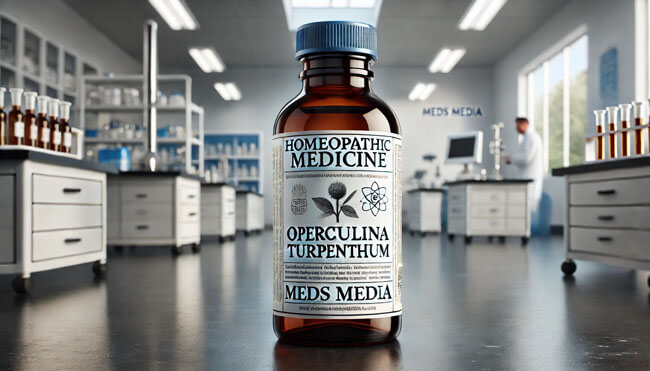OPIUM ( OP ) Homeopathic Uses & Treatment Insights
Hahnemann observed that Opium’s effects are among the most complex to evaluate compared to other remedies. In homeopathy, Opium primarily acts on the nervous system, creating a state of deep insensibility, sluggishness, and lack of vital response. It is indicated in conditions characterized by drowsy stupor, absence of pain, and overall torpor.
A distinguishing feature of Opium’s action is the profound sleepiness (sopor), accompanied by heavy, deep, and unrefreshing sleep, often with stertorous (snoring) breathing. The skin may appear clammy and sweaty, while the face takes on a dark, mahogany-brown hue, suggesting venous congestion and poor circulation.
Another hallmark of Opium is reduced sensitivity to external stimuli, including a diminished response to medicinal treatments even when well-indicated. Heat exposure often worsens symptoms or triggers their recurrence.
Opium’s influence on the neurological system manifests in a reduction of voluntary movement, pupil contraction, and impaired cognitive abilities, leading to diminished self-control, poor concentration, and weakened judgment. While it dulls mental faculties, it paradoxically heightens imagination.
Additionally, Opium suppresses nearly all bodily secretions except for perspiration, making it particularly relevant in cases of dry mucous membranes and lack of proper elimination. It is a key remedy for conditions arising from extreme fright, shock, or emotional trauma, often resulting in paralysis, unconsciousness, or profound apathy.
Key Attributes of Opium in Homeopathy
- Acts on the Central Nervous System: Induces drowsiness, stupor, and loss of consciousness.
- Affects Sensory Perception: Decreases pain sensitivity, creating a paradox where severe conditions occur without pain.
- Influences Digestive & Urinary Systems: Causes sluggish digestion and constipation.
- Regulates Respiratory Function: Useful in cases of stertorous breathing and respiratory failure.
- Addresses Conditions from Fright and Shock: Indicated in states of paralysis, loss of function, and deep unconsciousness post-trauma.
Key Symptoms of Opium (Homeopathic Materia Medica)
✔ Deep stupor, unconsciousness, complete loss of sensation
✔ Lack of reaction to stimuli, insensibility to pain
✔ Coma-like state, slow, stertorous snoring respiration
✔ Respiratory suppression, breathing stops during sleep (sleep apnea)
✔ Extreme drowsiness, falls into heavy
✔ Vertigo after fright, dull and heavy head, occipital pressure
✔ Half-closed eyes, contracted pupils, staring, glassy expression
✔ Bloated, dark, red face, swollen veins, besotted look
✔ Black-coated tongue, bloody froth from mouth, dry mouth
✔ Paralysis, painless, weak reflexes, opisthotonos (body arching backward)
✔ Hard, bloated abdomen, severe intestinal sluggishness
✔ Obstinate constipation, hard, black, round stools, feces protrude and recede
✔ Urinary retention, slow feeble stream, involuntary urination after fright
✔ Suppressed menses from shock, stopped labor pains with coma-like sleep
✔ Convulsions, twitching of limbs, worse from bright light
✔ Profuse hot sweating, but lower limbs remain dry
✔ Coma vigil, sleepy but unable to sleep, kept awake by distant noises
✔ Burning sensation in chest, slow pulse, fever with stupor
✔ Worse from heat, after sleep; better from cold things and walking
✔ Fright, shock, emotional trauma as a root cause of symptoms
Homeopathic Materia Medica of Opium
1. Mind & Mental State
Symptoms:
✅ Complete loss of consciousness, resembling an apoplectic state
✅ Indifference to surroundings; patient expresses no desires or needs
✅ Frightful hallucinations, irrational fear, or exaggerated cheerfulness
✅ Inability to comprehend or acknowledge pain and suffering
✅ Delirious speech, often with wide, staring eyes
✅ Disorientation; believes they are not at home
Materia Medica Insights:
Opium profoundly affects the mental sphere, inducing a state of deep stupor or unconsciousness. The patient lacks awareness of their surroundings and shows no concern for their condition, even in severe illness. This remedy is particularly useful in cases where there is mental shock, brain paralysis, or coma-like states.
The mental symptoms may present in extreme contrasts, where the individual fluctuates between frightful hallucinations, irrational euphoria, or an overly daring and carefree attitude. One characteristic feature is the delusion of not being at home, highlighting a sense of detachment from reality.
Delirium is another marked symptom, often accompanied by wide, fixed, staring eyes, indicating a disturbed nervous system and altered perception. These mental manifestations make Opium an essential remedy for conditions stemming from fright, shock, or emotional trauma that result in mental withdrawal or altered states of consciousness.
2. Head
Symptoms:
✅ Vertigo, especially in elderly individuals
✅ Sensation of lightness or emptiness in the head
✅ Dull, heavy, stupefying headache
✅ Delirium with confusion and lack of awareness
✅ Vertigo following fright or shock
✅ Severe pain and weight at the back of the head (occiput)
✅ Bursting sensation in the head
✅ Complete insensibility with an inability to process thoughts
✅ Brain paralysis leading to mental and physical inactivity
Materia Medica Insights:
Opium profoundly affects the nervous system, leading to deep mental confusion, dizziness, and a sense of heaviness in the head. It is particularly indicated for elderly individuals who experience vertigo and mental dullness, often feeling as though their head is empty or weightless.
A notable characteristic of Opium is delirium and mental insensibility, where the patient appears to have no grasp of their surroundings. The bursting headache and great weight at the occiput are key indicators, often found in cases of stroke, apoplexy, or post-fright nervous disturbances.
This remedy is beneficial for conditions where the brain appears paralyzed, leading to a lack of mental and physical response. The vertigo after fright is a distinctive symptom, making Opium a valuable remedy for those suffering from dizziness, mental confusion, or loss of coordination following emotional trauma.
3. Eyes
Symptoms:
✅ Half-closed eyes with a vacant, drowsy expression
✅ Pupils either contracted or dilated, unresponsive to light
✅ Drooping of the eyelids (ptosis)
✅ Staring, glassy appearance of the eyes
Materia Medica Insights:
Opium has a profound impact on the ocular system, primarily affecting pupil response, eyelid control, and visual perception. The eyes often appear half-closed, contributing to the characteristic drowsy, lethargic look seen in Opium patients.
One of the key indications is pupil irregularity—either excessively contracted (miosis) or unresponsive to light stimuli—which is a common sign of neurological suppression and central nervous system depression.
Another marked symptom is ptosis (drooping of the upper eyelid), making Opium a useful remedy in cases of eyelid muscle weakness, paralysis, or neurological disorders affecting the eye muscles.
The staring, glassy expression suggests a state of mental and sensory detachment, often seen in patients experiencing delirium, shock, or deep unconsciousness. These ocular symptoms reinforce Opium’s role in treating brain-related disorders, coma-like conditions, and post-trauma states where the patient appears visually unresponsive to their surroundings.
4. Face
Symptoms:
✅ Red, bloated, and swollen face, often appearing dark or suffused
✅ Hot sensation in the face, as if congested with blood
✅ Intoxicated or besotted expression, resembling drunkenness
✅ Spasmodic twitching of facial muscles, especially at the corners of the mouth
✅ Distended veins on the face, indicating venous congestion
✅ Lower jaw hangs down, suggesting muscular weakness or paralysis
✅ Distorted facial expressions, often appearing unnatural or contorted
Materia Medica Insights:
Opium’s influence on the circulatory and nervous systems is evident in the congested, swollen, and dark-colored appearance of the face. The redness and bloating are characteristic signs of venous stagnation, often seen in conditions involving stroke, apoplexy, or extreme nervous exhaustion.
The intoxicated or besotted look suggests a state of mental dullness or unconsciousness, where the individual appears heavily sedated, similar to the effects of alcohol or narcotics.
Another key feature is the spasmodic twitching of facial muscles, particularly around the corners of the mouth, indicating nervous system irritation. This, combined with distended veins and a hanging lower jaw, makes Opium a valuable remedy for neurological disorders, facial paralysis, and conditions resulting from nervous system suppression.
The distorted facial expressions further emphasize Opium’s role in treating cases of brain-related disturbances, deep stupor, and unconscious states, where the individual’s appearance reflects a loss of voluntary control over facial muscles.
5. Mouth
Symptoms:
✅ Dry mouth with an absence of normal saliva production
✅ Black-coated tongue, sometimes paralyzed or producing bloody froth
✅ Intense thirst, often for cold drinks
✅ Blubbering or quivering lips, suggesting lack of muscular control
✅ Difficulty in articulation, causing slurred or unclear speech
✅ Difficulty swallowing, as if the throat muscles are weak or unresponsive
Materia Medica Insights:
Opium significantly affects the oral cavity and throat, leading to dryness, paralysis, and impaired muscle control. A black-coated tongue is a key feature, often observed in serious illnesses or states of nervous exhaustion. In extreme cases, the tongue may be paralyzed, contributing to the inability to speak or swallow properly.
The presence of bloody froth indicates congested circulation and venous stasis, a common symptom in severe neurological conditions, apoplexy, or deep coma-like states.
A distinctive Opium symptom is blubbering or quivering lips, which suggests loss of muscular control in the mouth and facial region, further emphasizing the remedy’s role in treating neuromuscular paralysis and stroke aftermath.
The difficulty in articulation and swallowing highlights Opium’s role in conditions where the nervous system becomes sluggish, affecting voluntary movements, particularly in speech and deglutition (swallowing). This makes it useful in stroke recovery, apoplexy, and nervous system disorders where the patient struggles to coordinate speech and swallowing due to nerve suppression.
6. Stomach
Symptoms:
✅ Vomiting with colic and convulsions, often violent and forceful
✅ Fecal vomiting, indicating severe intestinal obstruction
✅ Incarcerated hernia, with intense abdominal pain and distension
✅ Hunger present but no desire to eat, as if the stomach is unresponsive
Materia Medica Insights:
Opium acts powerfully on the digestive system, particularly in cases where the stomach and intestines become sluggish or non-responsive. Vomiting in Opium cases can be severe and convulsive, often accompanied by abdominal cramps and spasms, reflecting deep nervous system suppression.
A critical indication for Opium is fecal vomiting, where the body attempts to eliminate waste through the stomach due to intestinal obstruction. This symptom is highly suggestive of intestinal paralysis, peritonitis, or severe constipation, where the intestines fail to perform normal peristalsis.
Opium is also useful in cases of incarcerated hernia, where a section of the intestine becomes trapped, causing pain, bloating, and an inability to pass stool or gas.
A peculiar symptom is the presence of hunger without a desire to eat, suggesting that while the stomach signals a need for food, the body’s overall sluggishness prevents the individual from responding to it. This highlights Opium’s action in cases of nervous system depression affecting digestive functions, making it a key remedy for paralytic ileus, severe constipation, and post-operative gut inactivity.
7. Abdomen
Symptoms:
✅ Hard, bloated, and tympanitic (drum-like) abdomen
✅ Severe colic, resembling lead colic
✅ Urging to stool but only passing hard, dry feces
Materia Medica Insights:
Opium has a profound effect on the abdomen and intestinal tract, primarily causing abdominal distension, hardness, and reduced peristaltic activity. The tympanitic (drum-like) abdomen suggests gas accumulation and intestinal obstruction, a key indication for this remedy in cases of paralytic ileus or postoperative bowel inactivity.
A characteristic symptom is lead colic, where the individual experiences severe cramping abdominal pain, often with an intense desire to pass stool but only expelling hard, dry feces. This reflects intestinal atony (lack of movement), making Opium particularly useful in chronic constipation, toxic bowel conditions, and severe colic cases where normal bowel function is suppressed.
The overall sluggishness of the digestive system in Opium cases results in inefficient bowel evacuation and painful distension, reinforcing its role in treating obstinate constipation, toxic megacolon, and conditions where the abdomen becomes rigid, swollen, and inactive.
8. Stool
Symptoms:
✅ Obstinate constipation, with no urge to pass stool
✅ Round, hard, black stools, resembling small balls
✅ Feces protrude and recede, as if struggling to be expelled
✅ Spasmodic retention of feces, causing abdominal discomfort
✅ Involuntary stools, often black, offensive, and frothy
✅ Violent pain in the rectum, described as if being forcibly stretched or torn apart
Materia Medica Insights:
Opium is one of the most effective remedies for extreme constipation, particularly when the bowels become inactive, and there is a complete absence of the desire to defecate. The stools are small, hard, round, and black, resembling goat droppings, a classic homeopathic symptom.
A peculiar characteristic is the protrusion and retraction of stool, where feces start to pass but then withdraw due to inadequate bowel force. This symptom, shared with Thuja and Silicea, highlights the lack of peristalsis and muscle control in the intestines.
In some cases, Opium also addresses spasmodic stool retention, where feces remain stuck in the intestines, causing severe bloating and discomfort. On the other extreme, Opium can be used in cases of involuntary stools, where the patient passes black, offensive, frothy feces, often seen in conditions involving nervous system suppression or paralytic states.
The violent rectal pain, described as if the rectum is being “torn apart,” is another guiding symptom, making Opium an essential remedy for painful constipation, nervous system-induced bowel inactivity, and toxic retention of waste in the body.
9. Urine
Symptoms:
✅ Slow to start urination, requiring effort to initiate the stream
✅ Weak, feeble urine flow, often in dribbling form
✅ Urine retention, especially following fright or shock
✅ Involuntary urination, occurring unconsciously
✅ Loss of bladder control or sensation, leading to an inability to recognize the need to urinate
Materia Medica Insights:
Opium has a profound effect on the urinary system, primarily by suppressing the natural reflexes needed for proper bladder function. A key indication is difficulty initiating urination, where the patient struggles to start the flow despite the bladder being full.
The urine stream is weak and feeble, often coming out in small, slow dribbles due to a lack of muscular control in the urinary tract. Opium is particularly useful in cases where urinary retention follows fright or emotional trauma, reflecting the remedy’s strong association with shock-induced paralysis of bodily functions.
In some cases, the bladder may become insensible, leading to involuntary urination, where the patient passes urine unconsciously without any awareness of the act. This is especially seen in neurological disorders, stroke, or coma-like conditions where bladder control is completely lost.
These symptoms make Opium an essential remedy for post-traumatic urinary retention, neurogenic bladder dysfunction, and urinary incontinence associated with central nervous system depression.
10. Female
Symptoms:
✅ Suppressed menstruation, particularly after experiencing fright or shock
✅ Cessation of labor pains, often accompanied by periods of deep unconsciousness (coma-like state) between contractions
✅ Threatened abortion, especially when linked to extreme fear or trauma
✅ Suppression of lochia (postpartum discharge) after fright, often with drowsiness and stupor
✅ Severe, labor-like uterine pains, causing a strong urge to pass stool
Materia Medica Insights:
Opium plays a crucial role in treating female reproductive system disorders that arise from shock, fright, or nervous suppression. One of its key indications is the sudden suppression of menses following an emotional trauma, where the body’s natural rhythm is interrupted due to nervous system depression.
It is particularly useful in pregnancy and childbirth-related conditions, where labor pains suddenly stop, and the woman falls into a coma-like state between contractions. This symptom suggests neurological exhaustion, preventing the uterus from maintaining consistent contractions.
Opium is also indicated in cases of threatened abortion, especially when triggered by intense fear, fright, or a traumatic emotional event. In such cases, the patient may also experience suppression of lochia, a condition where postpartum discharge ceases prematurely, often accompanied by deep drowsiness or stupor.
A unique symptom of Opium in gynecological cases is horribly intense, labor-like uterine pains, often leading to a strong urge to defecate. This reflects the remedy’s action on pelvic congestion and suppressed nervous function, making it an essential choice for conditions involving uterine inertia, retained lochia, and labor difficulties caused by emotional trauma or nervous system depression.
11. Respiratory
Symptoms:
✅ Breathing stops upon falling asleep, requiring external stimulation to restart
✅ Hoarseness, with a weak or suppressed voice
✅ Deep snoring and rattling, stertorous breathing, indicating obstructed airflow
✅ Difficult, intermittent, deep, and uneven respiration
✅ Sensation of heat in the chest, often with burning around the heart
✅ Cough with shortness of breath (dyspnea) and a bluish discoloration of the face
✅ Cough with bloody expectoration, suggesting respiratory distress
Materia Medica Insights:
Opium has a profound impact on the respiratory system, particularly in cases where breathing becomes irregular, labored, or suppressed due to nervous system depression. A hallmark symptom is breathing that ceases upon falling asleep, requiring external intervention (such as shaking the patient) to restart the respiratory process. This makes Opium a valuable remedy for sleep apnea and respiratory failure following shock or trauma.
The patient often exhibits deep snoring with rattling, stertorous breathing, indicating congestion and obstruction in the airways. This symptom is frequently observed in comatose states, post-stroke conditions, or respiratory depression caused by narcotic suppression.
Opium also addresses irregular breathing patterns, where respiration is deep, slow, and uneven, often requiring effort to sustain. Patients may report a burning sensation in the chest, particularly around the heart, highlighting Opium’s role in treating circulatory and respiratory distress.
A distinctive symptom is cough with shortness of breath and a bluish face, suggesting oxygen deprivation and poor circulation. In extreme cases, the cough produces bloody expectoration, making Opium a suitable remedy for severe respiratory conditions, such as pneumonia, pulmonary congestion, and late-stage lung disease.
Given its ability to address respiratory suppression, airway obstruction, and apnea-related symptoms, Opium is particularly indicated in cases of nervous system-induced respiratory depression, post-stroke breathing difficulties, and coma-like conditions with irregular respiration.
12. Sleep
Symptoms:
✅ Excessive drowsiness, (Gels.; Nux mosch) feeling overwhelmingly sleepy throughout the day
✅ Falls into a deep, heavy, and stupefying sleep, difficult to wake from
✅ Profound coma, where the patient is unresponsive and unconscious
✅ Breathing stops upon falling asleep, requiring external stimulation to restart (sleep apnea)
✅ Coma vigil, a state where the patient appears asleep but remains partially aware
✅ Restless picking at bedclothes, a sign of nervous system distress
✅ Feels very sleepy but is unable to sleep, indicating a disturbed sleep cycle
✅ Kept awake by distant noises, such as cocks crowing or other background sounds
✅ Children experience vivid dreams of animals (cats, dogs) or black forms
✅ Bed feels too hot, making it uncomfortable to lie down
✅ Dreams are often pleasant, fantastic, or amorous in nature
✅ Alternating chills and heat, with sleep and sweating
✅ Thirst present only during the heat stage of fever
Materia Medica Insights:
Opium has a powerful effect on the sleep cycle, making it one of the top remedies for extreme drowsiness, deep comatose states, and sleep disturbances caused by nervous system suppression. A key symptom is falling into a profoundly deep and stupefying sleep, where the patient appears unconscious and unresponsive, often difficult to wake.
In severe cases, Opium-induced sleep resembles a coma, where the patient lies motionless, unaware of their surroundings, with slow, labored breathing. A unique feature is loss of breath upon falling asleep, which makes Opium an excellent remedy for sleep apnea and respiratory suppression disorders.
Despite experiencing intense drowsiness, some Opium patients struggle to fall asleep, often due to heightened sensitivity to distant noises, such as cocks crowing or background sounds. This paradoxical symptom highlights Opium’s role in treating nervous system overstimulation leading to insomnia.
A peculiar characteristic in children is dreaming of animals (cats, dogs) or black shadowy forms, indicating heightened subconscious activity. Additionally, patients may report fantastic, pleasant, or amorous dreams, reinforcing Opium’s tendency to enhance imaginative and dreamlike states.
Another guiding symptom is the sensation that the bed feels too hot, making the patient restless and unable to stay still. This, combined with shaking chills followed by heat, sleep, and sweating, suggests Opium’s usefulness in fevers accompanied by deep drowsiness and disturbed sleep patterns.
Due to its ability to regulate deep sleep, comatose states, and nervous system-related sleep disorders, Opium is an essential remedy for narcolepsy, sleep apnea, post-traumatic sleep disturbances, and conditions involving prolonged unconsciousness or delirium.
13. Fever
Symptoms:
✅ Pulse is full and slow, indicating sluggish circulation
✅ Heat spreads over the entire body, with an internal sensation of warmth
✅ Profuse hot perspiration, often covering the body except for the lower limbs
✅ Fever accompanied by deep stupor, with little awareness of surroundings
✅ Snoring respiration, indicating obstructed or labored breathing during fever
✅ Twitching of limbs, suggesting nervous system involvement
✅ Intense thirst, but only during the heat stage of fever
✅ Extreme sleepiness, feeling drowsy or falling into a heavy, unresponsive sleep
✅ General low body temperature, with a tendency toward stupor or unconsciousness
Materia Medica Insights:
Opium is a significant remedy for fevers characterized by stupor, sluggish circulation, and nervous system suppression. A key feature is the full but slow pulse, indicating a lack of proper circulatory force, often found in low-grade fevers or fevers leading to unconsciousness.
A guiding symptom of Opium fevers is deep drowsiness, where the patient becomes lethargic, unresponsive, and difficult to rouse. The fever is often accompanied by stertorous (snoring) breathing, reinforcing its use in severe cases where the nervous system is profoundly affected.
The body becomes hot, with perspiration that drenches the skin, but despite the external warmth, there may be an underlying low body temperature, especially in cases of typhoid states, septic fevers, or fevers following shock or trauma.
Muscular twitching of the limbs is another notable symptom, indicating Opium’s role in treating fevers with neurological complications, including post-stroke states or fevers leading to convulsions.
The patient typically experiences intense thirst, but only during the heat stage of the fever, which helps distinguish Opium from other fever remedies.
Due to its ability to address stuporous fevers, sleep-inducing fevers, and nervous system suppression during febrile states, Opium is a key remedy in treating fevers associated with brain involvement, comatose states, and toxic conditions where the patient lies in a deep, heavy, and unresponsive sleep.
14. Back and Extremities
Symptoms:
✅ Opisthotonos, severe muscular rigidity causing the body to arch backward
✅ Swollen veins in the neck, indicating venous congestion
✅ Painless paralysis, where the limbs lose function without associated discomfort
✅ Twitching of limbs, often erratic and involuntary
✅ Numbness, with a lack of sensation in affected areas
✅ Sudden jerking movements, as if the flexor muscles are overactive
✅ Convulsions, triggered or worsened by exposure to bright light
✅ Coldness of the limbs, even when the body is warm
Materia Medica Insights:
Opium’s action on the nervous and muscular systems makes it a valuable remedy for paralysis, involuntary muscle movements, and neurological dysfunction. A characteristic feature is opisthotonos, where severe muscular contractions cause the body to arch backward, a symptom often seen in meningitis, tetanus, or severe nervous disorders.
Another key sign is painless paralysis, where the patient loses movement and function but experiences no pain. This highlights Opium’s nerve-suppressing action, making it useful in post-stroke paralysis, spinal cord injuries, and conditions with neurological weakness.
The swollen veins of the neck indicate circulatory stagnation and venous congestion, often found in apoplectic (stroke-like) conditions or cases of poor blood return from the brain.
Opium also addresses twitching and jerking of limbs, which appear as sudden, uncontrolled movements, often resembling overactivity of the flexor muscles. Convulsions are another important indication, particularly when they are triggered or worsened by bright light, reinforcing its role in epileptic and seizure disorders.
Additionally, numbness and coldness of the limbs suggest reduced circulation and nervous system inactivity, making Opium a key remedy for circulatory disorders, post-traumatic nervous conditions, and advanced states of nervous exhaustion leading to lack of muscle response.
15. Skin
Symptoms:
✅ Hot, damp skin, often feeling sticky and clammy
✅ Profuse sweating, particularly over the upper body
✅ Lower limbs remain dry despite excessive sweating elsewhere
✅ Constant desire to uncover, as if feeling too warm
Materia Medica Insights:
Opium has a marked effect on the skin, primarily causing profuse sweating and abnormal heat regulation. The patient often experiences hot, damp, and sticky skin, reflecting circulatory sluggishness and nervous system suppression.
A key distinguishing feature is asymmetrical perspiration, where the upper body sweats excessively while the lower limbs remain dry. This symptom is crucial in differentiating Opium from other remedies in cases of fevers, nervous exhaustion, or toxic states.
Another significant symptom is the constant desire to uncover, as if the patient feels overwhelmingly warm despite sweating. This unusual craving for exposure suggests disturbed thermoregulation, often seen in febrile conditions, nervous disorders, or post-stroke states.
Opium is therefore highly effective in fevers with heavy perspiration, toxic metabolic conditions, and nervous system disorders that alter normal sweating patterns, making it a key remedy for cases involving heat imbalance, sluggish circulation, and temperature dysregulation.
16. Modalities
Worse:
❌ Heat, whether external warmth or internal body heat
❌ During and after sleep, symptoms intensify upon waking
Better:
✅ Cold things, including cool air, cold drinks, or a cold environment
✅ Constant walking, as movement helps alleviate discomfort
Materia Medica Insights:
Opium symptoms are aggravated by heat, making the patient feel worse in warm environments, under covers, or after exposure to external heat sources. Additionally, symptoms tend to intensify during and immediately after sleep, often leading to increased respiratory suppression, unconsciousness, or lack of responsiveness.
On the contrary, the patient finds relief from cold applications, cool surroundings, and cold beverages, suggesting that Opium is well-suited for conditions where excessive internal heat leads to lethargy or sluggish body functions. Another important characteristic is improvement with continuous movement, where walking or mild physical activity helps counteract the deep nervous suppression seen in Opium cases.
These modalities provide crucial guidance in confirming Opium’s applicability in cases of nervous system depression, heat-induced aggravations, and conditions where movement helps counteract paralysis or sluggishness.
17. Relationship
Compare With:
🔹 Apis Mellifica – Similar aggravation from heat and sleep, nervous system effects
🔹 Belladonna – Intense congestion, delirium, and fever with stupor
🔹 Gelsemium – Profound weakness, drowsiness, and nervous system suppression
🔹 Nux Moschata – Extreme drowsiness, mental confusion, and lack of reaction
Similar Remedies & Their Key Differences:
🔸 Morphinum – Extreme susceptibility to pain, muscle twitching, abdominal tympanites, and intense itching
🔸 Codeinum – Dry, incessant, teasing cough; muscle twitching, particularly of the eyelids
🔸 Eschscholtzia-Cal (California Poppy) – A harmless soporific, used for mild sedation and sleep regulation
18. Antidote
For Acute Opium Poisoning:
☑ Atropin – A primary antidote to counteract Opium’s depressive effects on the nervous system
☑ Black Coffee – Helps stimulate the central nervous system, countering Opium-induced drowsiness and respiratory depression
For Chronic Opium Poisoning:
☑ Ipecac – Useful for relieving nausea and excessive mucus accumulation caused by prolonged Opium use
☑ Nux Vomica – Aids in detoxification, particularly for cases involving long-term narcotic use, digestive issues, and nervous system imbalances
☑ Passiflora – Helps in soothing withdrawal symptoms, reducing insomnia, and restoring natural sleep cycles
For Counteracting Opium Addiction:
☑ Berberis – A well-known homeopathic remedy that assists in reducing Opium dependency by supporting the liver, kidneys, and nervous system
19. Dose
💊 Potency Recommendations:
✔ 3rd to 30th potency – Suitable for acute conditions such as sudden fright-induced symptoms, constipation, or drowsiness.
✔ 200th potency – Recommended for chronic conditions involving deep-seated nervous system suppression, paralysis, or prolonged insensibility.
Select Your Homeopathic Medicine Dose and Potency
Potency Selection Guide
Relationship of Remedies
Similar Posts

NITRO MURIATICUM ACIDUM HOMEOPATHIC MATERIA MEDICA | Uses, Symptoms & Benefits Guide

NITRI SPIRITUS DULCIS HOMEOPATHIC MATERIA MEDICA | Uses, Symptoms & Benefits Guide

NUPHAR LUTEUM HOMEOPATHIC MATERIA MEDICA | Uses, Symptoms & Benefits Guide

NUX MOSCHATA HOMEOPATHIC MATERIA MEDICA | Uses, Symptoms & Benefits Guide

NUX VOMICA HOMEOPATHIC MATERIA MEDICA | Uses, Symptoms & Benefits Guide

NYCTANTHES ARBOR TRISTIS HOMEOPATHIC MATERIA MEDICA | Uses, Symptoms & Benefits Guide

OCIMUM CANUM HOMEOPATHIC MATERIA MEDICA | Uses, Symptoms & Benefits Guide

OENANTHE CROCATA HOMEOPATHIC MATERIA MEDICA | Uses, Symptoms & Benefits Guide

OLEUM ANIMALE AETHEREUM: HOMEOPATHIC MATERIA MEDICA – Symptoms Guide

OLEUM JECORIS ASELLI: HOMEOPATHIC MATERIA MEDICA – Symptoms Guide

OLEUM SANTALI: HOMEOPATHIC MATERIA MEDICA – Symptoms Guide

OLEANDER: HOMEOPATHIC MATERIA MEDICA – Symptoms Guide

ONISCUS ASELLU: HOMEOPATHIC MATERIA MEDICA – Symptoms Guide

ONOSMODIUM VIRGINIANUM: HOMEOPATHIC MATERIA MEDICA – Symptoms Guide

